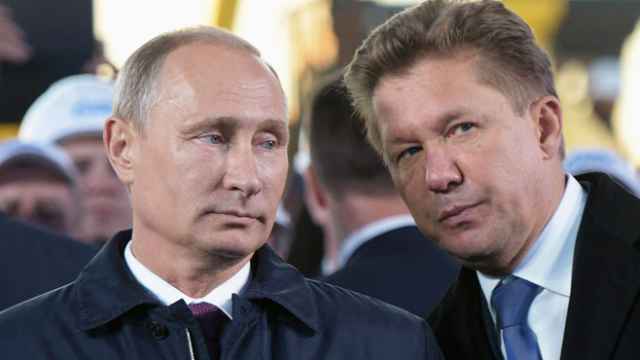WARSAW/PRAGUE — Poland's gas importer said it received only about half of the natural gas from Russia that it had asked for on Wednesday, stoking tensions between the two neighbors at odds over the stand-off over Ukraine.
There was no sign of any shortages of Russian gas in the rest of Europe, which relies on Russia for about a third of its gas, indicating that this was not the 'gas war' that some European governments feared could break out this autumn.
But energy analysts in Warsaw said Russia may be using deliveries to Poland to send Europe a calibrated warning that it will retaliate if Brussels imposes new sanctions on Moscow over its intervention in Ukraine.
"You could say that Russia is putting in place sanctions against us," said Jaroslaw Kaczynski, a former Polish prime minister who now leads the opposition. "It is part and parcel of Russia's overall aggressive strategy to rebuild its empire."
The Polish state-controlled gas importer, PGNiG, said in a statement on Thursday it had received 45 percent less natural gas on Wednesday than it requested from Gazprom. It releases information about gas volumes with a one-day lag.
There was also a fall in the amount of gas passing through Slovakia, a major hub for Russian gas exports to Europe, according to the pipeline operator Eustream.
It did not give a figure for the drop, and said the reduced volumes were cleared with Gazprom and the European gas importers who are its customers.
Gazprom said it was pumping the same amount to Poland, 23 million cubic meters a day, as it had been last week. "Our volumes to Poland are not falling," said Gazprom spokesman Sergei Kupriyanov.
But the Polish grievance focused on the gap between the volumes it requested and actual deliveries.
The Polish importer did not specify how much it had requested for Wednesday, but said the volumes sought were below the maximum allowable under their contract.
PGNiG said it had so far received no explanation for the shortfall. The firm said its lawyers were analyzing whether the shortfall put Gazprom in breach of its contract.
In Slovakia, gas importer SPP said it experienced a drop in gas supplies from Russia of about 10 percent on Thursday, for the second day running.
The importer is only one of several customers that use the Eustream-operated pipeline, so the direct impact on overall gas flows passing across Slovakia is likely to be limited.
Reverse Flows
Poland said it has increased imports of gas from Germany and the Czech Republic to cover the shortfall from Russia, and there has been no disruption in deliveries to customers, or any need to tap underground gas storage reservoirs.
It said the problem has forced it to temporarily halt the re-export of Russian gas to its neighbor Ukraine, however. Gazprom has cut off Ukraine's gas in a pricing dispute, and these "reverse flows" from Kiev's European allies are crucial for preventing a fuel crisis there.
A spokesman for Ukraine's gas monopoly Ukrtransgas said: "The supply from Slovakia and Hungary is stable while we have disruption of supply from Poland. Poland promised to resume supply this weekend."
Some Polish energy analysts have said Gazprom may be trying to discourage EU countries from bailing out Ukraine with reverse flow deliveries.
Though Poland does ship some of its Russian gas onward to Germany, the reduced volumes are unlikely to have a knock-on effect for customers in Europe unless they drag on for weeks.
Mild temperatures mean that demand for fuel is relatively low, and European operators have been building up reserves of gas in storage in anticipation of possible disruptions.
Gas pipeline operators in Hungary and Bosnia said that they were receiving Russian gas as normal.
There was no spike in prices on the spot market for gas, which would react to any shortage.
"Looking at prices, the market has ignored whatever statements the Polish have made," said Oliver Sanderson, an analyst at Point Carbon.
Earlier this month, PGNiG said it expected to obtain larger discounts on gas during a round of negotiations with Gazprom scheduled to take place in November. In 2012 the company secured a discount of over 10 percent.
Each country negotiates with Gazprom individually, with those that rely most heavily on Russian supplies, including Poland, often paying the most.
A Message from The Moscow Times:
Dear readers,
We are facing unprecedented challenges. Russia's Prosecutor General's Office has designated The Moscow Times as an "undesirable" organization, criminalizing our work and putting our staff at risk of prosecution. This follows our earlier unjust labeling as a "foreign agent."
These actions are direct attempts to silence independent journalism in Russia. The authorities claim our work "discredits the decisions of the Russian leadership." We see things differently: we strive to provide accurate, unbiased reporting on Russia.
We, the journalists of The Moscow Times, refuse to be silenced. But to continue our work, we need your help.
Your support, no matter how small, makes a world of difference. If you can, please support us monthly starting from just $2. It's quick to set up, and every contribution makes a significant impact.
By supporting The Moscow Times, you're defending open, independent journalism in the face of repression. Thank you for standing with us.
Remind me later.





